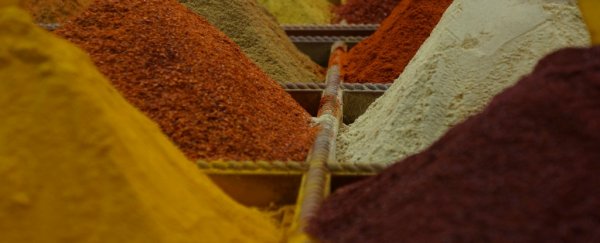The bright yellow compound found in the spice turmeric - known as curcumin - has been shown to improve working memory and attention span in older adults, researchers have found.
Curcumin has already been shown to supress traumatic memories in mice, sooth bowels, and help heal wounds, and in a recent study, researchers in Australia found evidence it could also help us stay mentally sharp as we age.
But how does a spice that we use in curries manage to do all of this?
"Curcumin has multiple physiological effects," said lead researcher of the 2015 paper, Andrew Scholey, from Swinburne University of Technology. "It's known to reduce inflammation and improve blood flow. It influences multiple processes that nudge brain function in a positive direction."
In their initial research, Scholey and his team recruited 60 volunteers aged between 60 and 85, and split them into two groups. One group was given capsules with a solid lipid curcumin formulation, and the other a placebo.
The participants then completed a number of computerised mental tasks – such as word and picture recall, simple subtraction, and reaction time tasks - a few hours after taking the supplement, and then after taking it daily for four weeks.
Overall, the participants who'd taken the curcumin capsules performed better at the computerised measures of working memory and vigilance. They also reported feeling reduced fatigue as well as improved calmness, contentedness, and stress during testing at the end of the four-week trial.
"To our knowledge this is the first study to examine the effects of curcumin on cognition and mood in a healthy older population or to examine any acute behavioural effects in humans," the researchers reported in the Journal of Psychopharmacology last year.
They also found that there were benefits outside of cognitive improvements.
"A significant acute-on-chronic treatment effect on alertness and contentedness was also observed. Curcumin was associated with significantly reduced total and LDL (low-density lipoprotein) cholesterol and had no effect on haematological safety measures," they reported.
The researchers have now received a grant to further investigate the properties of curcumin, and will be looking at neuroimaging and genetic markers to better understand curcumin's potential psychological and cognitive benefits.
Maybe one day, curcumin could be as successful as willow bark has been in creating aspirin, and opium poppies have been when it comes to make morphine. Natural herbs and phytochemicals can be great sources of healing… when scientifically proven to work.
Swinburne University of Technology is a sponsor of ScienceAlert. Find out more about their innovative research.
